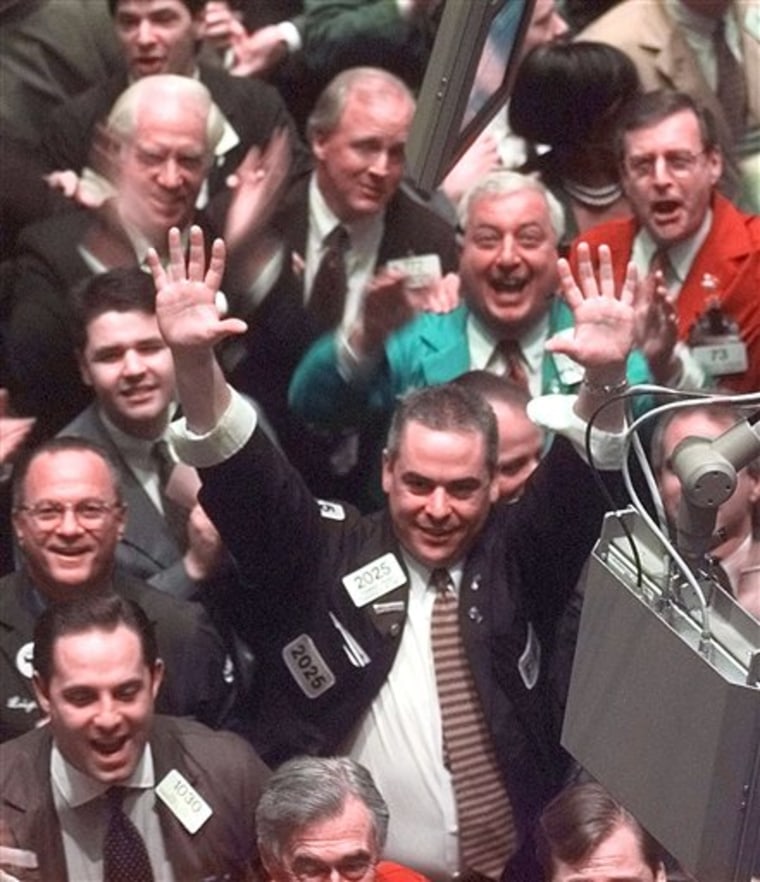It began as an age of economic wonders.
A time when a dot-com startup that never came close to a profit spent millions to make a singing sock puppet a star of the Super Bowl. A time when one of economists' big worries was what might happen if unemployment fell too low. Back when Enron was a fabulous investment and subprime loans exemplified U.S. financial innovation.
Most never saw the collapse of the First Bubble coming. Or the rise of the Second Bubble behind it that made its predecessor seem almost quaint. Or the Great Recession that seeded fears of — perish the thought — the Next Bubble.
What a long, strange and deeply disturbing ride it's been on the economic roller coaster these past 10 years. And though the decade is ending, there's no telling whether the turbulence is over.
As policy makers fought over the past year to right the economy, there have been warnings the U.S. could be destined for a "lost decade," like the stagnation that grasped Japan through the 1990s.
In fact, Americans have already weathered a very different kind of lost decade.
The domestic economy since 2000 has been anything but stagnant. But as the decade ends, consumers and workers, investors and industries find themselves with little, if anything, to show for it.
"If you look at almost any financial indicator, we are far worse off than we were in the year 2000," says Sung Won Sohn, a professor of economics at California State University's Channel Islands campus.
U.S. families earn less now then they did when the decade began. Median family income fell to $61,521 in 2008 from $63,099 in 2000, according to the most recent inflation-adjusted figures from the Census Bureau. A decade of declining income would be the first since the agency began tracking it in 1947.
The sense that we've lost ground is confirmed by the job market.
At the start of the decade, the economy employed 130.8 million people. Ten years later, the nation's population has grown by more than 30 million, swelling the numbers of eligible workers. But the U.S. is shedding jobs. Today, the economy employs almost exactly the same number as it did when the decade began.
The futility is born out by the stock market. On New Year's Eve of 1999, the Dow Jones industrial average closed just below 11,500. Ten years later, even after soaring from its depths, it is cheered for crossing back over 10,000.
The decade's backslide has not been limited to the U.S.; the collapse of the credit bubble has ravaged economies like Ireland and England. Export-dependent Japan sustained significant damage.
But while the recession has been global, the decade still anointed winners. China, India and, to a lesser extent, countries like Brazil, have matured into new economic powers. In particular, China — soon likely to overtake Japan as the world's second largest economy — asserted itself as a formidable trading partner, global lender, and power broker that could not be ignored.
The rise of these new economic powers reinforces the challenges faced by the U.S.
When the decade began the U.S. was riding a tremendous wave of confidence, with a formula for growth seemingly unchallenged by any international or ideological rival. The Internet revolutionized business. It enabled workers to be far more productive than ever before. Unemployment fell below 4 percent and incomes were rising for most households.
"We were living on our hopes that the mundane reality of the human condition had been transcended ... that humans had settled on democratic capitalism," says Joseph Brusuelas of Moody's Economy.com. "It didn't turn out that way."
Still, even the collapse of the Internet bubble didn't erase that confidence. After recovering from the shock of the 2001 terror attacks, Americans again embraced the prospect of a brave, new economy — one reliant on cheap and easy credit.
Looking back, it's easy now to retrace the path that lead to the meltdown. Euphoria over new technology encouraged rampant speculation. The Federal Reserve expanded credit far too rapidly. Wild risk-taking by Wall Street became the norm.
But ordinary people, too, played their part.
"We, the consumers, had been lulled into thinking that prosperity could last forever, relying heavily on credit such as home equity loans," Sohn says.
Now, the hope is that we've put the crisis of the past year behind us. Investors are betting the economy is poised for a resurgence. But the damage done by the excesses of recent years could take much longer to undo.
A decade ago, the economy was an incredible job generation machine. Now, though, "the labor market is fundamentally broken," Brusuelas says. There's a good chance that even a year or two of "jobless recovery" like the period that followed the bursting of the Internet bubble won't remedy the problems. The economy has been wrenched into a new era and many Americans may find the jobs they lost simply are not coming back, he said.
"I think there are a lot of shoals ahead of us," Sohn says.
He notes that every major financial crisis of the past century has inflicted damage that lasted for years afterward. If history holds true, then the turmoil of the past decade may not be over — no matter how eager we may be to celebrate its departure.
